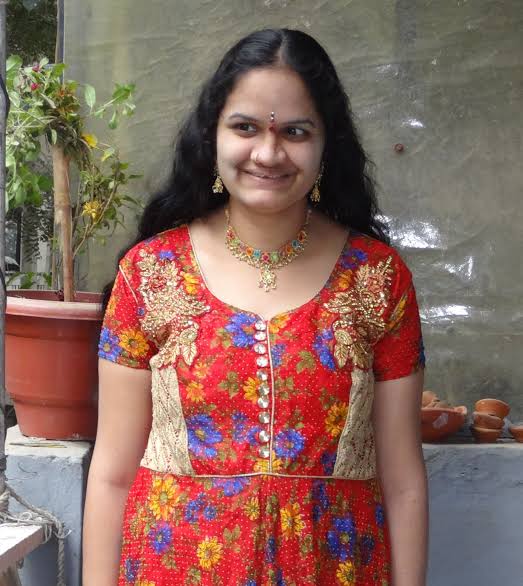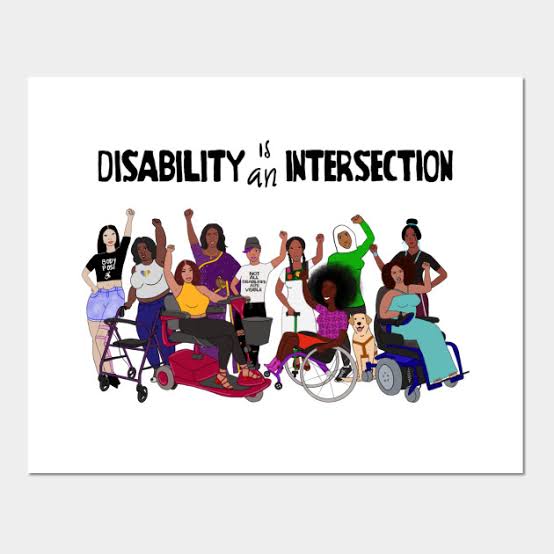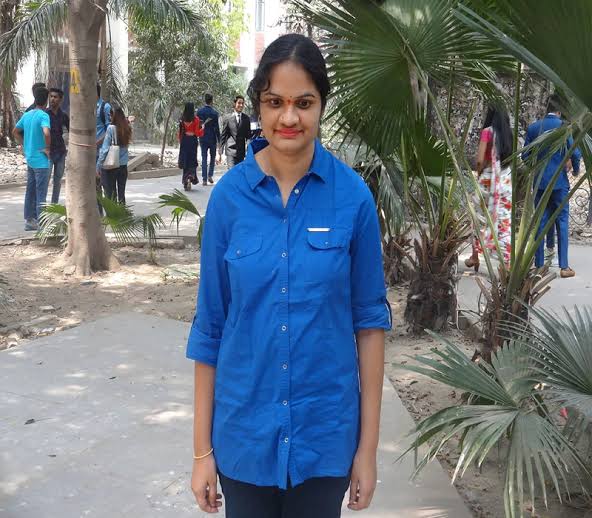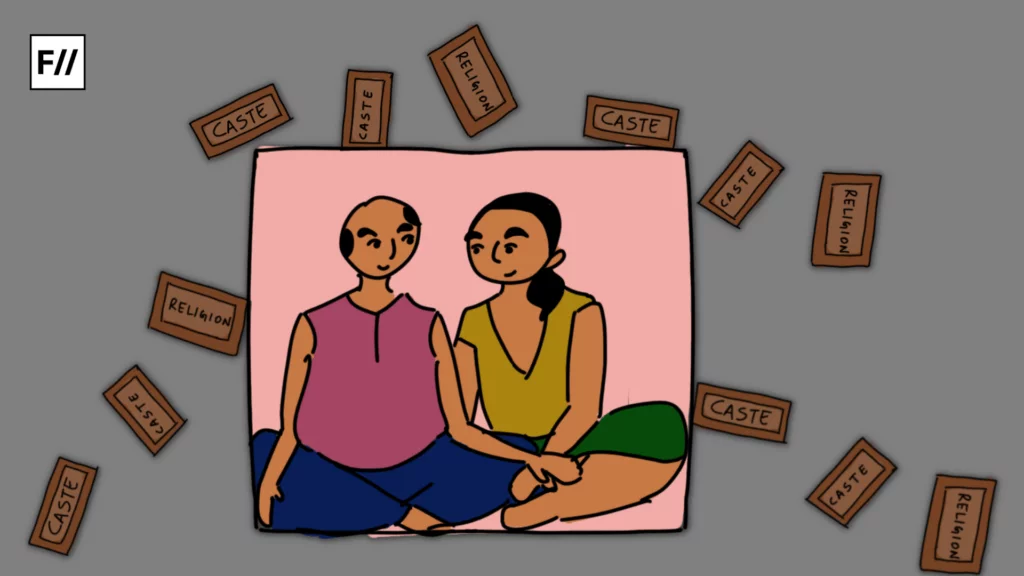Jyothsna, on the occasion of International Day Of Persons With Disabilities, wrote to Feminism In India, with a piece of article attached to her mail. The article listed six books written by six different Indian women with disabilities. The article informed me about the kinds of works disability rights activists or women with disabilities have been doing, but they fail to become the “bestsellers”, unless someone is making a movie out of it. The list was of course not exhaustive but rather sparked hope for more of such texts. I wanted to know more about our writer!
Jyothsna, being the literature enthusiast herself, would definitely agree that the “mainstream”, in any field, in this case literature, is constructed and reconstructed by people with power and “ability”. They manipulate the world of any sphere, thereby making disability, sometimes an “afterthought”, especially for “political correctness” or tokenistic “inclusivity”. But our lives are not that simple, especially if we fall into any category of marginalisation. Jyothsna fell into three, or maybe more. However, that did not stop her from exploring the world and navigating it through her own ways, just like any of us do.

Dr. Jyothsna Phanija, is an Assistant Professor of English at ARSD College (University of Delhi). She has obtained PhD in English Literature from English and Foreign Languages University, Hyderabad in 2016 at the age of 25. She has worked on gender and madness in postcolonial literature to analyze “madness as a form of resistance”. Her first poetry book, Ceramic Evening got published by Writers Workshop in 2016.
With writer Nivedita N., she has edited an anthology of visually impaired poets and short story writers titled The World I Write In, which was also published in 2016. She has translated two poetry collections from Telugu to English Crimson Lamp (2015) and Stoned Song (2019). She write short stories, research articles and general essays, when she is not singing. She is the personification of a confluence where the tributaries of caste, gender and disability meet. These may have brought in multiple hardships in her life. However, she strives to make herself heard through her writings, and I am guessing, sometimes also through her singing (?)
In conversation with Jyothsna Phanija, to know a little more about her and a little better about the society and its intersections of caste, gender and disability.
What are the memories that you can recall from your childhood? What was it like to grow up as a lower caste woman with disabilities?
Jyothsna Phanija: I am from a village called Kaikalur in Krishna district, Andhra Pradesh. Even today caste discrimination occurs there. When food is served in a temple, separate tables are arranged for each caste. The temple committee members strictly ask the people to disclose their caste—whether they are from the lower caste—and are told to wait till the Brahmins and Vaishyas finish their meals. There is no discrimination to raise donations for arranging the food, but to eat that, caste differences appear out of nowhere. Sadly, caste hasn’t yet got the status of “once upon a time”. Caste is still rooted in the social system.
Coming to disability, the oppression happens at multiple levels. When caste and disability form one’s identity, it primarily results in lack of resources. In my college years, people used to say “I thought you are a Brahmin. Aren’t you?” and I used to take it as a token of compliment. Same happens with disability. “You don’t appear like a disabled.” I used to get some sense of achievement out of their ignorance. Slowly, I have come to realize that all these comments are the result of their misjudgement of people with lower caste and disabilities. Disabled people don’t have any identical characteristics, and the same is with caste.
I feel disheartened when some of my disabled friends cherish the compliments of not appearing like a disabled, and some of my family members and relatives enjoy the compliments like, “your house is as clean as the house of the brahmin”, or “you do puja (worship) like a brahmin”, or “you know everything about religion like a brahmin”. As long as we acknowledge the supremacy of the other, we never achieve our own dignity. As long as we don’t decipher the meaning of any compliment especially which takes us away from our own social positioning that is historically entrenched in oppression, the hierarchies continue for more centuries.
As long as we acknowledge the supremacy of the other, we never achieve our own dignity. As long as we don’t decipher the meaning of any compliment especially which takes us away from our own social positioning that is historically entrenched in oppression, the hierarchies continue for more centuries.
We would like to hear about the challenges that you have faced as an OBC woman, with disability.
Jyothsna Phanija: Due to my caste status, our social relations and networking is limited, resulting in isolation. As a visually impaired woman, several challenges are given in terms of education and employment. Non-disabled members still have many prejudices about people with disabilities. Many of the disabled people experience discrimination till today. We should be given an opportunity at the first place to work at the organizational level. If we fail, then we could be taken away from a particular task. Often somebody else decides our capability on behalf of our own agencies. This is the bigger challenge.
What are the real life manifestations of the intersections of living as a lower caste women with disability? Were there any specific incidents of discrimination that you would like to share with us?
Jyothsna Phanija: If we take into account of the successful disabled people, who have been able to make a mark in society, many of them are from the higher castes. When studies are conducted on caste, disability is not included. When disability related research is conducted, caste factor is not taken into consideration. From ages, learning or the space and resources to learn rests with higher castes.
In our household, where education is absent, acceptance to disability is invisible. The real challenge I still face is explaining myself everyday. Non-disabled people are hurtfully curious. At this age, explaining how I work on computers with a screen reader, how I manage my phone with voice over, what are the adaptations I made to study and do household tasks, looking after the house and children, are not so easy all the time at all the places. Learning about the lives of the disabled people, is not rocket science.
When I had applied to become a lecturer in Government Polytechnic College, in Andhra Pradesh, I had to write the exam at Sarojini Naidu Vanitha Mahavidyalaya, at Hyderabad, as it was the exam centre for that particular preliminary test. It’s a women’s college and many of the teachers were women. But they were so insensitive; they said they cannot give me a scribe to write the exam. They reiterated that, since polytechnic colleges come under technical education, they cannot accept a Person with Disability to write the exam. But I protested and wrote the exam. I got qualified in the written test. When I went for the interview at APPSC, they raised the same point again: “Reservation for PWDs is not applicable” was mentioned in the notification and further told me that I shouldn’t attend the interview. “The subject I will be teaching if selected is English. It has nothing to do with technical education,” I said. I told them to consider me against the unreserved or OBC, if PWD reservation is not applicable. They took the interview only to maintain a record of the applicants. This was a humiliating experience. I didn’t take any legal actions against them. Later, I got employment in ARSD.
Even today, we are always questioned. People often associate people like me as the receivers of double benefits in terms of reservations for OBCs and PWDs, undermining our hard work. Caste system and oppression against the disabled, still continue because of the sustained prejudices.
Even today, we are always questioned. People often associate people like me as the receivers of double benefits in terms of reservations for OBCs and PWDs, undermining our hard work. Caste system and oppression against the disabled, still continue because of the sustained prejudices. If we have to consider the intersectionality of caste and disability, an example can be: a visually challenged brahmin can become an astrologer, following the ancestor’s tradition; can the same happen at the household of carpentry Or farming? While disabled people from the upper class receive respect at some point based on their caste privilege, disabled people from lower caste, receive only sympathy on good days and discrimination on the bad ones. As long as we categorize learning and literacy as respectable jobs and others as odd jobs, the inequality continues.
On a lighter note, we would also like to hear about your moments of joy and victory or happiness, solidarity and support that you have received or you have had the chance to express.
Jyothsna Phanija: I got a lot of support from my friends in college. Walking along the college lanes with my friend Shanthi, sharing the commentary on different MA classes with my friend Abhinaya, and many such moments are joyful in my life. My mother and father always supported me for my education. My husband supports me in several ways. Receiving a Letter of Appreciation from the Prime Minister of India, Mr. Narendra Modi, on 29th March 2017 for my book Ceramic Evening, receiving National Award Role Model Persons with Disabilities on 3 December 2017 from the President of India, Ram Nath Kovind, are my most memorable experiences.
Lastly, on the International Day of Persons With Disabilities, what are the concerns that you would like to flag that could help us become a more inclusive society?
Jyothsna Phanija: Inclusive society can happen with an inclusive mindset. As long as we speak the words like “blind belief”, “crippled government”, and even write books like Make the Deaf Hear, inclusive society is just a reverie. Language plays a very important part in expressing sensitivity and practicing inclusivity. But we are not changing our biased language which actually propagates negative attitude.
Disability is nature’s diversity. It is created to increase the cognitive abilities of the non-disabled people. They shouldn’t associate their positioning as care providers, and disabled people at the receiving end. Instead, non-disabled people should be able to see both groups in equal terms.
Apart from lack of proper infrastructure, and inaccessible websites, we have many other challenges to an inclusive society. One of them is the views and perceptions of the non-disabled people. They often think that they are the care givers to the disabled people whenever they help us. Actually it’s mutual learning. Non-disabled people in the companionship of the disabled, will become well versed in communications, will be able to understand the others and will be able to become good policy makers. If sighted people read for the visually impaired, their reading abilities will be increased.

Disability is nature’s diversity. It is created to increase the cognitive abilities of the non-disabled people. They shouldn’t associate their positioning as care providers, and disabled people at the receiving end. Instead, non-disabled people should be able to see both groups in equal terms. Disability studies should be included in Indian universities. Disability should be seen from sociological perspective. Students in schools and colleges should be sensitized about disability. Whenever disability related conferences happen, or an expert in disability studies delivers a talk, only the disabled people, their friends, their parents attend them, who are already sensitized. For this reason, disability studies should be made compulsory.
A message for all
Jyothsna Phanija: While caste is an unscientific division, disability, as a stereotyping agent of separation, that leads to the uncivilized position of the society. Societal progress is measured in terms of not only the economic development, but with the equality it can offer. If knowledge and abilities can equally be used for the societal growth, it results in progressed society. Then why should we segregate the disabled people and the lower castes?
Also read: In Conversation With Srishti Pandey: The Gendered Aspects Of Disability
With such a well articulated understanding of the world, we only get a glimpse of the life of Jyothsna and her everyday. It is inspiring at the least, and motivating at the most, to have had the opportunity to know about people like her, who are continuously striving harder to sensitise people and the society about the need for a more inclusive system of leading life.
Featured Image Source: Reader’s Digest
About the author(s)
Pragya is a Master's Graduate in Sociology from Jawaharlal Nehru University. She works as the content editor at Feminism In India. She is also a ramen enthusiast, a hummus mother, a postcard hoarder and a wannabe cat lady. She still prefers writing on her notebooks, rather than on her laptop, but her job demands her to do just the opposite. Her favourite season is spring, and her alter ego is that of Mrs. Dalloway who said, "She would buy the flowers herself", in case no man ever buys her any!




